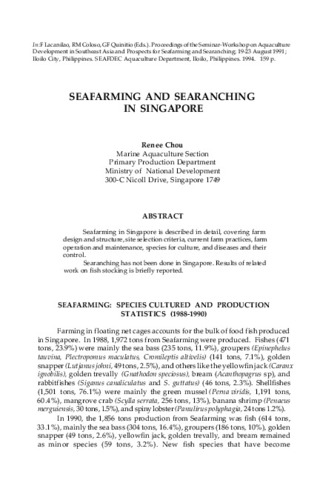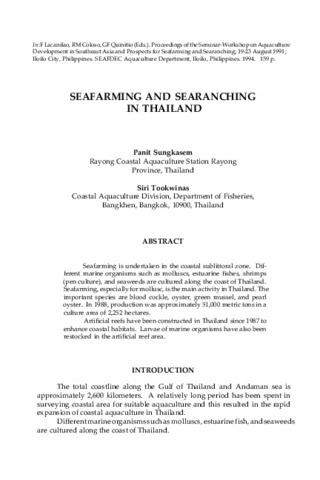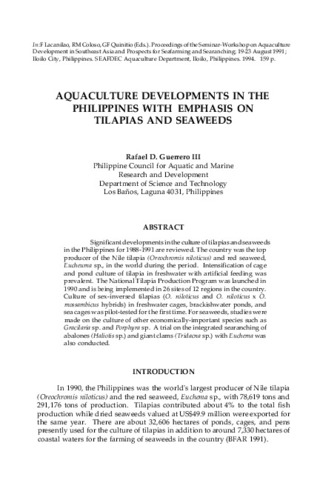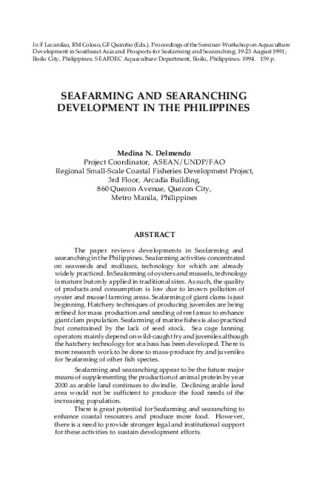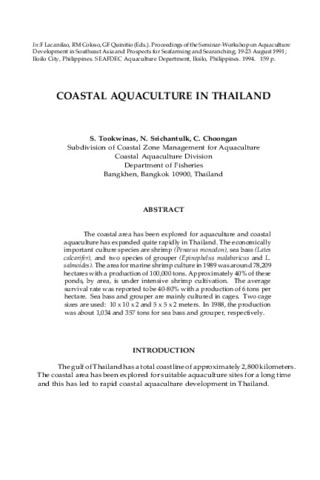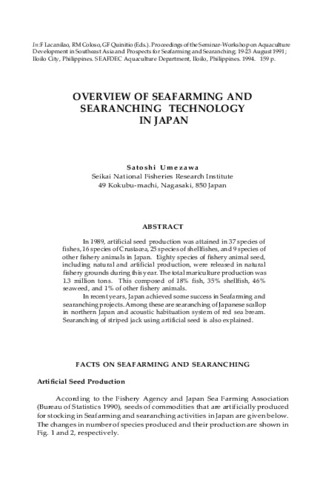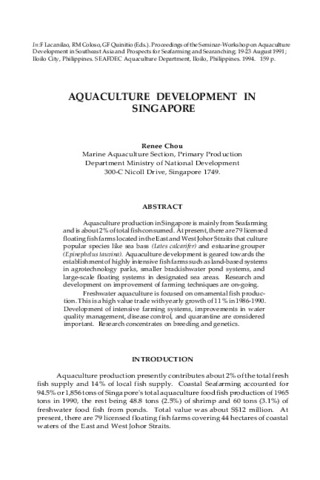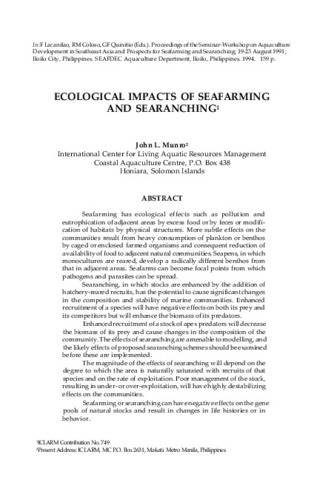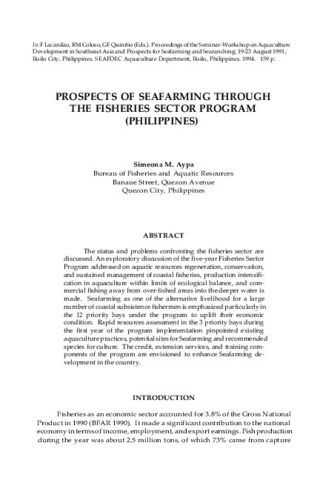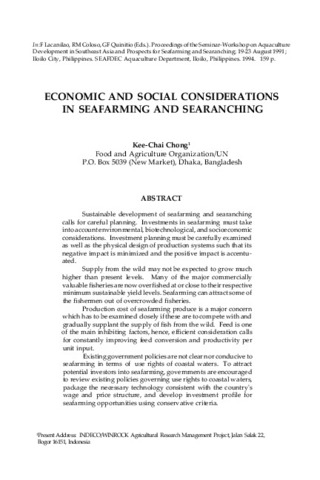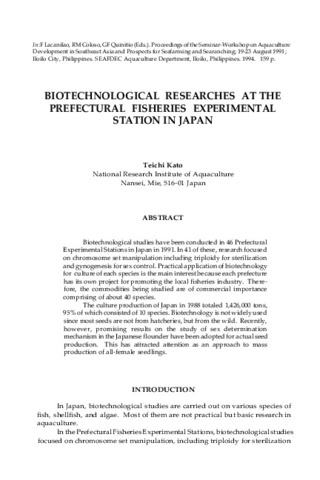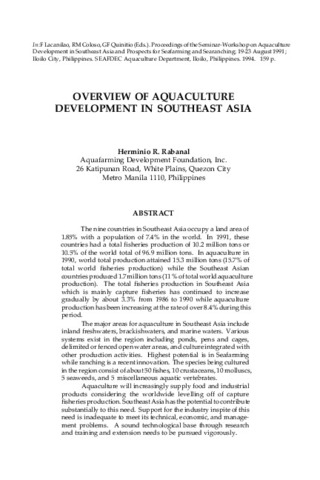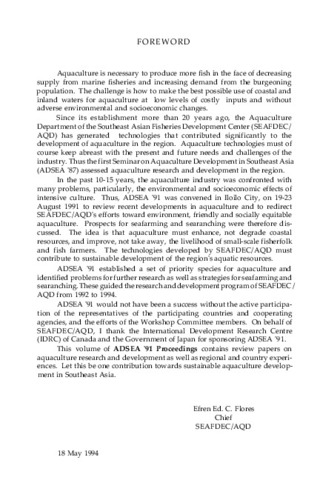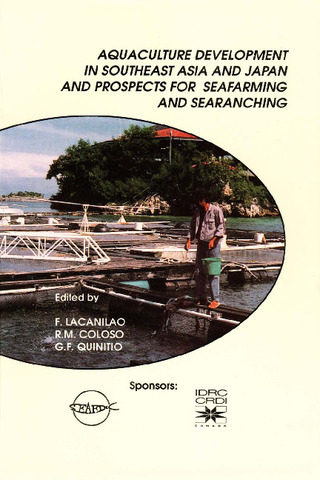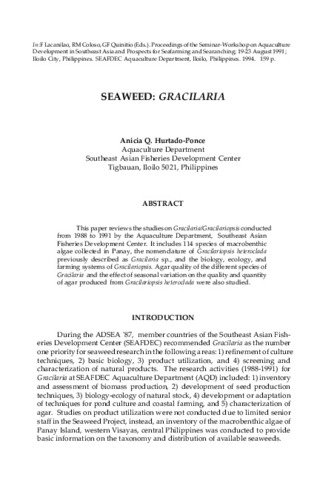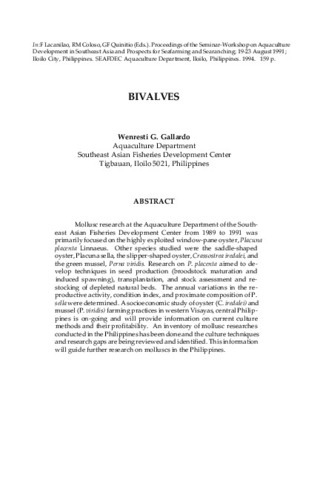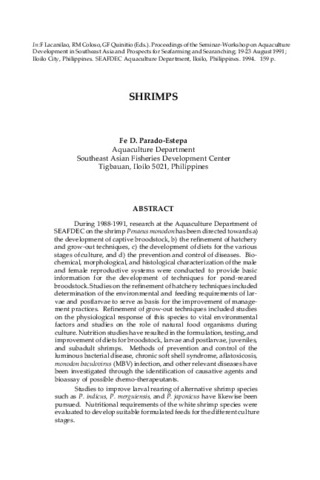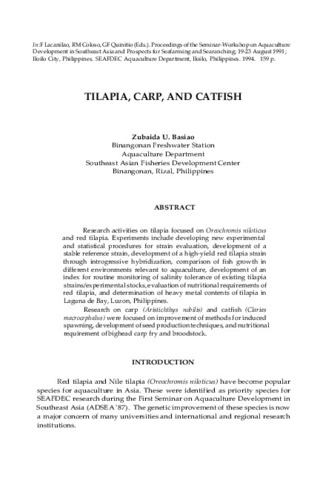ADSEA '91: Recent submissions
Now showing items 1-20 of 21
-
Proceedings of the Seminar-Workshop on Aquaculture Development in Southeast Asia and Prospects for Seafarming and Searanching, 19-23 August 1991, Iloilo City, Philippines
(Aquaculture Department, Southeast Asian Fisheries Development Center, 1994)Documents the presentations at ADSEA '91, the 2nd Seminar-Workshop on Aquaculture Development in Southeast Asia. ADSEA '91 includes reviews of the status of the researches conducted by Southeast Asian Fisheries Development ... -
Seafarming and searanching in Singapore
(Aquaculture Department, Southeast Asian Fisheries Development Center, 1994)Seafarming in Singapore is described in detail, covering farm design and structure, site selection criteria, current farm practices, farm operation and maintenance, species for culture, and diseases and their control.Searanching ... -
Seafarming and searanching in Thailand
(Aquaculture Department, Southeast Asian Fisheries Development Center, 1994)Seafarming is undertaken in the coastal sublittoral zone. Different marine organisms such as molluscs, estuarine fishes, shrimps (pen culture), and seaweeds are cultured along the coast of Thailand. Seafarming, especially ... -
Aquaculture developments in the Philippines with emphasis on tilapias and seaweeds
(Aquaculture Department, Southeast Asian Fisheries Development Center, 1994)Significant developments in the culture of tilapias and seaweeds in the Philippines for 1988-1991 are reviewed. The country was the top producer of the Nile tilapia (Oreochromis niloticus) and red seaweed, Eucheuma sp., ... -
Seafarming and searanching development in the Philippines
(Aquaculture Department, Southeast Asian Fisheries Development Center, 1994)The paper reviews developments in Seafarming and searanching in the Philippines. Seafarming activities concentrated on seaweeds and molluscs, technology for which are already widely practiced. In Seafarming of oysters and ... -
Coastal aquaculture in Thailand
(Aquaculture Department, Southeast Asian Fisheries Development Center, 1994)The coastal area has been explored for aquaculture and coastal aquaculture has expanded quite rapidly in Thailand. The economically important culture species are shrimp (Penaeus monodon), sea bass (Lates calcarifer), and ... -
Overview of seafarming and searanching technology in Japan
(Aquaculture Department, Southeast Asian Fisheries Development Center, 1994)In 1989, artificial seed production was attained in 37 species of fishes, 16 species of Crustacea, 25 species of shellfishes, and 9 species of other fishery animals in Japan. Eighty species of fishery animal seed, including ... -
Aquaculture development in Singapore
(Aquaculture Department, Southeast Asian Fisheries Development Center, 1994)Aquaculture production in Singapore is mainly from Seafarming and is about 2% of total fish consumed. At present, there are 79 licensed floating fish farms located in the East and West Johor Straits that culture popular ... -
Ecological impacts of seafarming and searanching
(Aquaculture Department, Southeast Asian Fisheries Development Center, 1994)Seafarming has ecological effects such as pollution and eutrophication of adjacent areas by excess food or by feces or modification of habitats by physical structures. More subtle effects on the communities result from ... -
Prospects of seafarming through the Fisheries Sector Program (Philippines)
(Aquaculture Department, Southeast Asian Fisheries Development Center, 1994)The status and problems confronting the fisheries sector are discussed. An exploratory discussion of the five-year Fisheries Sector Program addressed on aquatic resources regeneration, conservation, and sustained management ... -
Economic and social considerations in seafarming and searanching
(Aquaculture Department, Southeast Asian Fisheries Development Center, 1994)Sustainable development of seafarming and searanching calls for careful planning. Investments in seafarming must take into account environmental, biotechnological, and socioeconomic considerations. Investment planning must ... -
Biotechnological researches at the Prefectural Fisheries Experimental Station in Japan
(Aquaculture Department, Southeast Asian Fisheries Development Center, 1994)Biotechnological studies have been conducted in 46 Prefectural Experimental Stations in Japan in 1991. In 41 of these, research focused on chromosome set manipulation including triploidy for sterilization and gynogenesis ... -
Overview of aquaculture development in Southeast Asia
(Aquaculture Department, Southeast Asian Fisheries Development Center, 1994)The nine countries in Southeast Asia occupy a land area of 1.85% with a population of 7.4% in the world. In 1991, these countries had a total fisheries production of 10.2 million tons or 10.5% of the world total of 96.9 ... -
ADSEA '91-Foreword
(Aquaculture Department, Southeast Asian Fisheries Development Center, 1994) -
ADSEA '91-Preliminary pages
(Aquaculture Department, Southeast Asian Fisheries Development Center, 1994)Cover page, title page and table of contents -
Seaweed: Gracilaria
(Aquaculture Department, Southeast Asian Fisheries Development Center, 1994)This paper reviews the studies on Gracilaria/Gracilariopsis conducted from 1988 to 1991 by the Aquaculture Department, Southeast Asian Fisheries Development Center. It includes 114 species of macrobenthic algae collected ... -
Bivalves
(Aquaculture Department, Southeast Asian Fisheries Development Center, 1994)Mollusc research at the Aquaculture Department of the Southeast Asian Fisheries Development Center from 1989 to 1991 was primarily focused on the highly exploited window-pane oyster, Placuna placenta Linnaeus. Other species ... -
Shrimps
(Aquaculture Department, Southeast Asian Fisheries Development Center, 1994)During 1988-1991, research at the Aquaculture Department of SEAFDEC on the shrimp Penaeus monodon has been directed towards a) the development of captive broodstock, b) the refinement of hatchery and grow-out techniques, ... -
Tilapia, carp and catfish
(Aquaculture Department, Southeast Asian Fisheries Development Center, 1994)Research activities on tilapia focused on Oreochromis niloticus and red tilapia. Experiments include developing new experimental and statistical procedures for strain evaluation, development of a stable reference strain, ... -
Sea bass, groupers and snappers
(Aquaculture Department, Southeast Asian Fisheries Development Center, 1994)Studies on sea bass (Lates calcarifer) broodstock were directed at techniques to maximize egg production. Now known are the: optimum luteinizing hormone releasing hormone analogue (LHRHa) dose range to induce spawning, ...


